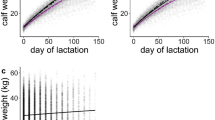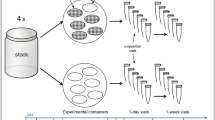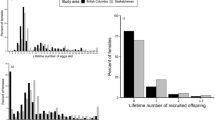Abstract
Like a number of plants1,2, some mammals commonly produce more progeny than they can afford to rear, terminating investment in some or even all of their offspring once the resources available for breeding are known3–5. Adaptive interpretations of juvenile wastage rely on the argument that the costs of gestation are small compared to those of feeding offspring. Though energetic evidence supports this conclusion6, it is unsafe to assume that the relative costs of gestation and lactation to the mother's survival and future reproductive success follow the same pattern because lactation commonly coincides with the period of maximum food availability. Controlling for individual variation, we show that in wild red deer (Cervus elaphus L) any costs of gestation to the mother's subsequent survival and reproductive success are slight compared to those of lactation.
This is a preview of subscription content, access via your institution
Access options
Subscribe to this journal
Receive 51 print issues and online access
$199.00 per year
only $3.90 per issue
Buy this article
- Purchase on Springer Link
- Instant access to full article PDF
Prices may be subject to local taxes which are calculated during checkout
Similar content being viewed by others
References
Stephenson, A. G. Ecology 61, 57–64 (1980).
Stephenson, A. G. A. Rev. Ecol. Syst. 12, 253–279 (1981).
Rivers, J. P. W. & Crawford, M. A. Nature 252, 297–298 (1974).
Gosling, L. M. Am. Nat. 127, 772–795 (1986).
Tait, D. E. N. Am. Nat. 115, 800–808 (1980).
Oftedahl, O. T. Symp. Zool. Soc. Lond. 51, 33–85 (1984).
Clutton-Brock, T. H., Guinness, F. E. & Albon, S. D. Red Deer: the Behaviour and Ecology of Two Sexes (University of Chicago Press, Chicago, 1982).
Guinness, F. E., Clutton-Brock, T. H. & Albon, S. D. J. Anim. Ecol. 47, 817–832 (1978).
Albon, S. D. & Clutton-Brock, T. H. in Ecological Change in the Uplands (eds Usher, M. B. & Thompson, D. B. A.) 93–107 (Blackwell, Oxford, 1988).
Clutton-Brock, T. H. & Harvey, P. H. Proc. R. Soc. B 205, 547–565 (1979).
Partridge, L. & Harvey, P. H. Nature 316, 20 (1985).
McCullough, P. & Nelder, J. A. Generalized Linear Models (Chapman & Hall, London, 1983).
Albon, S. D., Mitchell, B., Huby, B. J. & Brown, D. J. Zool. 209, 447–460 (1986).
Cox, D. R. The Analysis of Binary Data (Methuen, London, 1970).
Clutton-Brock, T. H., Major, M., Albon, S. D. & Guinness, F. E. J. Anim. Ecol. 56, 53–67 (1987).
Fowler, C. H. Current Mammalogy 1, 401–441 (1987).
Author information
Authors and Affiliations
Rights and permissions
About this article
Cite this article
Clutton-Brock, T., Albon, S. & Guinness, F. Fitness costs of gestation and lactation in wild mammals. Nature 337, 260–262 (1989). https://doi.org/10.1038/337260a0
Received:
Accepted:
Issue Date:
DOI: https://doi.org/10.1038/337260a0
This article is cited by
-
Associations between glucocorticoids and habitat selection reflect daily and seasonal energy requirements
Movement Ecology (2024)
-
Influence of maternal characteristics and reproductive history on recruitment in an iteroparous ungulate
Evolutionary Ecology (2023)
-
Ageing red deer alter their spatial behaviour and become less social
Nature Ecology & Evolution (2022)
-
Variation of dipteran ectoparasites (Streblidae) on Anoura geoffroyi Gray, 1838 (Phyllostomidae) in two caves in southeastern Brazil
Parasitology Research (2022)
-
Livestock displace European mouflon from optimal foraging sites
European Journal of Wildlife Research (2022)
Comments
By submitting a comment you agree to abide by our Terms and Community Guidelines. If you find something abusive or that does not comply with our terms or guidelines please flag it as inappropriate.



